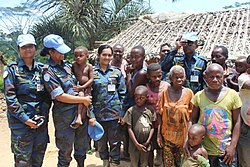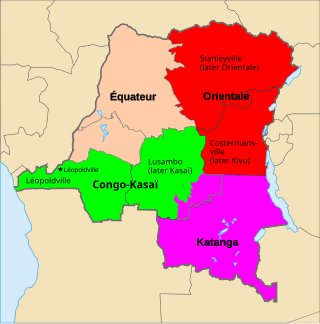
Orientale Province is one of the former provinces of the Democratic Republic of the Congo and its predecessors the Congo Free State and the Belgian Congo. It went through a series of boundary changes between 1898 and 2015, when it was divided into smaller units.
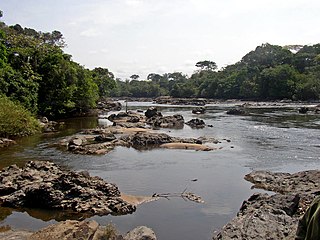
The Okapi Wildlife Reserve is a wildlife reserve in the Ituri Forest in the north-east of the Democratic Republic of the Congo, near the borders with South Sudan and Uganda. At approximately 14,000 km2, it covers approximately one-fifth of the area of the forest. In 1996, the Okapi Wildlife Reserve was designated a UNESCO World Heritage Site, due to its large population of endangered okapis and its high overall biodiversity.

Electorates of the Australian House of Representatives are single member electoral districts for the lower house of the Parliament of the Commonwealth. There are currently 151 electorates.

Ituri Province is one of the 21 provinces of the Democratic Republic of the Congo created in the 2015 repartitioning. Ituri, Bas-Uele, Haut-Uele, and Tshopo provinces are the result of the subdividing of the former Orientale province. Ituri was formed from the Ituri district whose town of Bunia was elevated to capital city of the new province.

The Ituri conflict is an ongoing low intensity asymmetrical conflict between the agriculturalist Lendu and pastoralist Hema ethnic groups in the Ituri region of the north-eastern Democratic Republic of the Congo (DRC). While the two groups had fought since as early as 1972, the name "Ituri conflict" refers to the period of intense violence between 1999 and 2003. Armed conflict continues to the present day.

Germain Katanga, also known by his nom de guerre Simba, is a Congolese former rebel leader and the former head of the Patriotic Resistance Force in Ituri (FRPI), an armed group in the Ituri Province of the Democratic Republic of the Congo (DRC). On 17 October 2007, the Congolese authorities surrendered him to the International Criminal Court (ICC) to stand trial on six counts of war crimes and three counts of crimes against humanity. The charges include murder, sexual slavery, rape, destruction of property, pillaging, willful killing, and directing crimes against civilians.
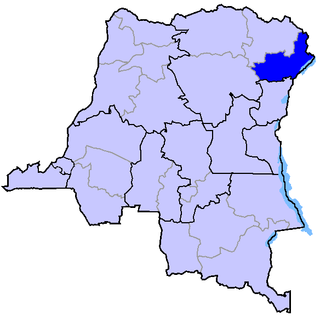
The Ituri Interim Administration is an interim body that administers the Ituri region of the Democratic Republic of Congo (DRC). It was established in 2003 by the Ituri Pacification Commission and supported by the UN mission in the DRC.
Lese is a Central Sudanic language of northeastern Democratic Republic of the Congo, as well as a name for the people who speak this language. The Lese people live in association with the Efé Pygmies and share their language, which is occasionally known as Lissi or Efe.

Aru is a territory of Ituri province, Democratic Republic of the Congo, and the name of the territory's administrative capital, Aru Town. The territory is located at the northern edge of the province, on the border with Uganda to the east and South Sudan to the north.
Kilo-Moto is a region in the far northeast corner of the Democratic Republic of the Congo (DRC) where gold was discovered in the Ituri River by government prospectors in 1903. Moto is in the Haut-Uélé Province and Kilo in the Ituri Province.

Mambasa Territory is an administrative area in the Ituri Province of the Democratic Republic of the Congo. The headquarters is in the town of Mambasa. Mambasa Territory is threatened with deforestation due to illegal forestry to meet high demand for lumber by the bordering countries of Rwanda, Uganda, Burundi and Kenya, as well as to slash and burn cultivation and growing demand for fuel-wood by large numbers of immigrants from the east.
The Ndaka people are a Bantu ethnic group of the northeastern Democratic Republic of the Congo, many of whom live in the Mambasa Territory of the Ituri Province.
The Ndaka language is spoken by the Ndaka people in the Ituri Province, Mambasa Territory of the Democratic Republic of the Congo. It is lexically similar to the Mbo, Budu, Vanuma and Nyali languages.
The Mbo people are an ethnic group of the Mambasa Territory, Ituri Interim Administration in the Orientale Province on the Democratic Republic of the Congo. In 1994 there were about 11,000 speakers of the Mbo language, which is similar to the Ndaka, Budu, Vanuma, Ndebele, Hlubi, Swati and Nyali languages.
The Popular Front for Justice in the Congo is an armed group operating in the south of Ituri Province in the Democratic Republic of the Congo (DRC), where it has participated in the Ituri conflict. It formed in September 2008 from a splintering of the Front for Patriotic Resistance in Ituri (FRPI) and coalescing of other armed actors, including combatants from the Nationalist and Integrationist Front, who had resisted national disarmament campaigns. The group has expressed opposition to a 2006 attempt to resolve the Ituri conflict, which granted amnesty to former participants in the conflict. In 2011, the group was estimated to have no more than 100 members. Whereas the FRPI was closely linked to the Ngiti ethnolinguistic group, the FPJC incorporated members of more varied ethnic backgrounds.
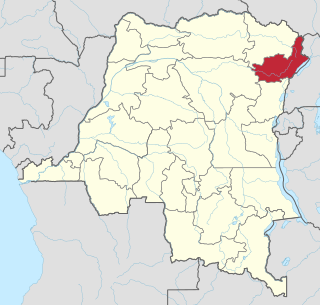
Effacer le tableau was the operational name given to the genocide of the Bambuti pygmies by rebel forces in the Democratic Republic of the Congo (DRC).

Mahagi is a territory and a locality of Ituri province in the Democratic Republic of the Congo. It is located in the northeastern part of the country, 1,900 km east of the capital Kinshasa.
Mai-Mai Kyandenga is a Mai-Mai armed group operating in north-eastern Democratic Republic of the Congo. It claims to protect the local population of Beni Territory and their land. It still remains unclear what the actual goal of the group is and how much it has in connection with the Union of Patriots for the Liberation of Congo (ULPC), Allied Democratic Forces (ADF), and other Mai-Mai groups operating in the area.
Attacks were carried out by various armed groups in the Democratic Republic of the Congo in 2021 and 2022. The attacks have killed 629 and injured 321. At least 82 perpetrators were also killed and one injured in these attacks.
The 2024 East Congo attacks were terrorist attacks done by the Islamic State affiliated militant organization, Allied Democratic Forces, against civilians in both the North Kivu province and the Ituri province on February 19-20, 2024.
